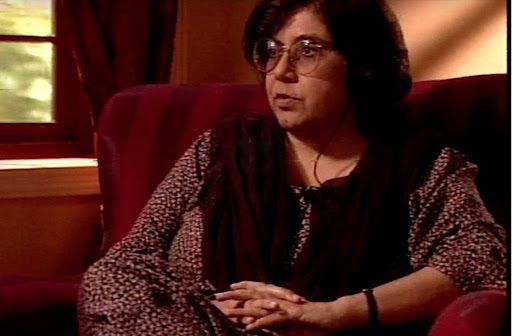
30. Remembering Renu Saluja
Exactly I don’t remember the year but I suppose it was 1984 or 1985 when I first met Renu Saluja (1952 – 2000). Those days I was posted in Pune and had a good friend whose father was in the security department of Film and Television Institute of India (FTII).
Having easy access, I often used to visit the campus and see movies at the Film Archives. That time it was housed in a very beautiful Bungalow opposite FTII. I still remember its staircase decorated with the photographs of Satyajit Ray and other famous film directors.
When I first saw her, Renu Saluja was crossing the Law College Road, coming towards Film Archives.
I vividly remember my friend’s whisper “that girl you see, she edited Ardha Satya.”
I had seen the film which was declared an instant hit, and appreciated not only for Om Puri’s histrionics and Govind Nihlani’s brilliant direction but also for its sharp, fast and crisp editing.
It was sheer fun watching fading images from one scene to another virtually hitting the viewer with the creative force of filmic reality.
Till that time, I was not much aware of the role of a film editor.
My friend knew her. He introduced me and told her about my interest in Cinema. She just smiled and in her very mild voice said that “I’m in a hurry right now but I’m in the city and tomorrow we can meet.”
Next day we met at a small restaurant outside the FTII gate and she paid for the tea and snacks.
What attracted me, and why I still fondly remember her, was her approach towards completely unknown faces. We felt like meeting an elder sister when she scolded for something I don’t remember.
We again had a chance meeting. It was when Prakash Jha came to FTII with his film ‘Damul’ which later won the National Award and was the first film to be premiered on Doordarshan. Renu was not the editor of Damul.
It was 16th August 2000. I was in Delhi office when I received a small piece of paper coming out of the PTI’s teleprinter. I was stunned. “Renu Saluja died, barely 48, at the Bombay Hospital after battling stomach cancer for the past six months.”
An image is still imprinted in my mind when she said with a wry grin that she had applied to the direction program but they found in her a lack of vision and she ended up on the editing program.
The ‘lack of vision’ statement was very confusing to me because I believe she was blessed with the creative acumen which ultimately made her one of the best film editors.
That time she was in Pune to teach a workshop at the Institute. We spent hours together, in fact the full day I was with her. She answered all my questions and advised me to read Karel Reisz and Gavin Millar.
Renu was a 1976 batch graduate, a four-time winner of the National Film Award for Best Editor.
She worked with the best directors, right from Govind Nihlani to Mahesh Bhatt, comfortable with both Art and Commercial films.
Not many people are aware of the job of a film editor. The first to edit a movie was one American Edwin S Porter, one of Edison’s first cameraman, who in 1902 made ‘The Life of an American Fireman’ and later ‘The Great Train Robbery’.
Pudovkin in his Theory of Constructive Editing claim that a scene is most effectively presented by linking together a series of specially chosen details of the scene’s action.
In fact, it is said that the development of film technique has been primarily the development of editing. No doubt the editing of a sound film begins long before it reaches the Cutting Room.
Cinema’s insistence on realistic presentation, dramatic story telling, making the visual climax coincide with the musical climax and shooting with multiple cameras and varies locations have made the editor’s role very important.
Only in the process of editing that the shots acquire their significance and however good the director’s raw material it is in fact the editor who makes or mars a film.
Renu Saluja was the most versatile and had the feel for the subject of the film she was working. She was simply brilliant.
But to me, she was an elder sister, who still makes me cry even when our interaction was limited to just five meetings.